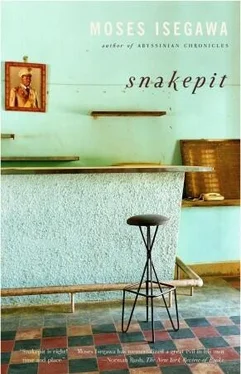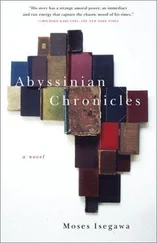The trouble with living in posh areas was the lack of public transport. The nearest bus stop was two kilometres away. Babit reluctantly called a taxi. How long would the money stretch? She had been the one who refused a joint account, for fear that he might be testing her to see if she was after his money. He had offered to open an account for her, but she had stopped him. He will be back, she said to herself as the taxi drove away. Deep blue skies, green leaves, red flowers gripped her imagination.
Babit’s arrival at her parents’ home was an ordeal. The beaming faces, the glinting eyes that came to welcome her were to be slashed to ribbons with the news. She had fortified herself with the words of the Bible, but in the end she gave in and cried. Her father looked on, mouth open, perplexed. It struck him that if Bat had married his daughter she would be a potential widow. The family sat down and went over the details. The uncertainty seemed to temper all emotions, cautioning against extreme reactions, outbursts. They remembered the first day he came to visit, exuding the kind of class every parent wished on his or her children. They remembered the recent feast, the gifts from Arabia. They remembered the time he appeared on national television, seeing a dignitary off at the airport. Babit’s father had talked it over with his friends. Television was only for those with status, power, and knowledge, something to say or show. He had felt a bit afraid, as if his future son-in-law had become too visible.
General Bazooka’s favourite method of break-ing the tension knotted inside him by paranoia, too much work, and the unending pressure of power and responsibility, was hosting orgies. This was the time when he indulged himself and did whatever came into his head. The house, a huge bungalow lighted like a burning ship, would be full of his friends, who would drink, smoke pot, gamble, fornicate and swear deep into the night. His favourite trick was to shoot beer bottles placed next to his friends, and, to perfect the skill, he practised assiduously every week. In the migratory season he often challenged them to shoot birds flying over his house for five hundred dollars per bird. He won most of the time because even if he was drunk, his aim was steady and his friends became reluctant to accept the challenges.
“Come on, Major,” he would say playfully, knowing that nobody could refuse, at least not on two separate occasions, “what will you tell your grandchildren? This is the only occasion we get to spend money meaningfully, I can assure you.”
“All right, General, we shoot two birds and only two and then resume our drinking,” the victim would say to all-round approval and raucous laughter.
As always, they would get carried away as soon as they handled the gun, miss a lot and eventually a heap of dollar bills would pile up at the General’s feet.
“I told you,” General Bazooka would say, “the best man wins, I can assure you.”
In the middle of the night, with every guest drunk or stoned, with nothing to aim at except the trees, the whole group would go outside and start shooting at the stars. There were often Russian roulette competitions, beer-drinking contests and duels fought out in bulletproof vests. The General loved holding beer in his cheeks and spraying his guests, especially his dates or pickups. At other times, they all pissed in the bathtub all night long, rolled the dice at the end of the party, and the loser would be made to strip and bathe in the piss. During those moments of wildness, with guns blazing, beer frothing, drugs smouldering, he would imagine somebody, a rival general, an officer from the Military Police, stepping in to interrupt the meeting. He always wondered how the encounter would end. Most probably in a fatal shoot-out.
“I am a prince,” he always said when he became drunk. “I can do whatever I want, I can assure you. If I want somebody’s eye, I pluck it. If I want somebody’s arm, I harvest it, ha-ha-ha. It is what the princes of old used to do, ha-ha-ha.” And the whole group would join in and cheer.
“This is what we fought for,” a general or colonel would say.
“That was before that reptile came,” a brigadier cut in one evening, shutting up every guest, all of them afraid that General Bazooka was going to erupt or reach for his gun.
“Forget about the reptile, Brigadier. When we are here, it does not exist, I can assure you.”
“Long live Marshal Amin Dada.”
There were times when General Bazooka drank and pissed and shat his pants. He would command his date to disrobe him and clean the mess. He would watch as the woman struggled not to show outward disgust, now and then firing his pistol and swearing. His bodyguards enjoyed the fuss and could be heard laughing in adjacent rooms.
For the orgies, the General had two houses in the suburbs. For decent parties, when he entertained normal guests, he went to his first wife’s home. He had given her a mansion at Kasubi, a place famous for the tombs of the banned kings. Driving past the tombs in his fleet of Boomerangs, headed and tailed by Stingers with soldiers hanging precariously on the sides like fruit bats, gave him untold satisfaction. At such moments he felt linked to the old kings, whose centuries of absolute rule he had played a part in ending, first with the attack on the palace, then when Marshal Amin refused to reinstate the kingdoms. As he rolled by, he would think back to 1942 when the last king was crowned. This man with titles such as the Professor of Almighty Knowledge, the Father of All Twins, the Cook with All the Fire-wood, the Power of the Sun, the Conqueror, had fled when he, Colonel Bazooka, had attacked his palace. The Conqueror had been in exile when Marshal Amin, King of Africa, created the new line of kings and princes now in power. It felt sublime to be the man of the moment.
When the body of the Conqueror was brought back to Uganda for burial in 1973, he had been the officer in charge of security at the airport, at Namirembe Cathedral, at the burial site. It was as if the Marshal wanted the people who had begun the demolition of this institution to hammer the last nail in its coffin. He liked to think that his father would have enjoyed seeing his son wielding so much power. Sleep well, old man, he would think, I hope there is a lot of booze where you are.
The only thing the General envied the old kings was the loyalty of their subjects. However grotesquely they misused their power, however many people they killed, people still loved and obeyed them, ready to give their lives for them. He remembered the lines of mourners filing past the coffin, orderly tear-sodden kilometres peopled by men and women who would have braved the hottest sun or the heaviest rain just to have the chance to peek at their king for the last time. As a non-monarchist, the sight made him sick. More so, because now he knew that not many southerners would mourn the passing of Marshal Amin’s regime; but then again, no one came to power in order to court a grand funeral procession. Power was there for more basic things, like a fleet of Boomerangs, money, the ability to hammer your word into law.
Through the tinted window of his car he saw civilians walking, cycling, hurrying to their destinations before the curfew set in. It was good not to be afraid of violating curfew laws as these men and women were. It seemed their world never changed: the old kings might as well have been lording it over these very same people; the new kings and princes were now having their turn. At one time he had been like them, caught in a static world devoid of power, shat on up to the eyeballs. Now he was doing the dumping on, and it felt good. At one time he was a victim, swaying to the whims and will of other men; now he was the one whom victims begged for mercy, the man they respected or feared, the man who had the option of treating them with utter contempt and getting away with it.
Читать дальше











